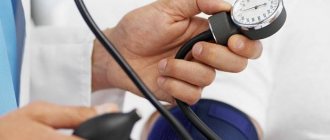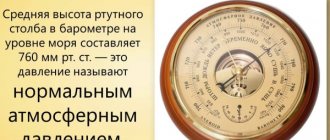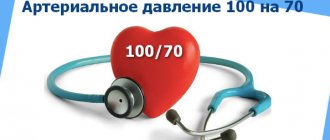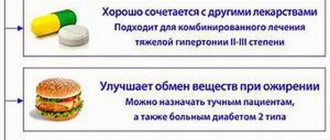What atmospheric pressure is considered low, at what pressure does a headache occur?
Normal atmospheric pressure for humans is 760 mmHg.
If your barometer indicates that it is lower, then the atmospheric pressure is considered low.
Each person reacts differently to a decrease in atmospheric pressure. Moreover, the weather dependence figure can fluctuate within wide limits. Typically, older people, hypertensive and hypotensive people are sensitive to the weather. The condition of mentally ill people also changes during a cyclone.
Most often, headaches occur when the reading drops to 750 mmHg.
The ideal value is 760 mmHg. Art. That is, 750 mm of mercury is not enough and a person may feel unwell.
The effect of reducing pressure on a person to 750 mmHg:
- A change in optimal indicators (up to 10 mm/h) already leads to a deterioration in well-being.
- With a sharp increase or decrease (on average by 1 mm/h), even healthy people experience a significant deterioration in well-being.
- Headache, nausea, and loss of performance appear.
Weather sensitivity index: how to determine
If earlier many doctors dismissed patients who complained of deterioration in health due to weather changes, now it is customary to carefully examine them and even calculate the meteosensitivity index.
The meteosensitivity index (meteotropic index) is a general medical assessment of the patient’s meteolability (sensitivity to changes in weather conditions).
To determine the level of weather lability, doctors are guided by a set of specific clinical criteria. Most often, the 10 most popular questions are used to collect anamnesis:
- complaints when weather or climate changes;
- decreased activity;
- deterioration of health;
- tendency to depression;
- anticipation of a change in the weather situation: signal reactions of the body even before the weather changes;
- repeatability of the same signs in a specific weather situation;
- synchronicity of meteorological reaction with other weather-sensitive people;
- normalization of well-being in favorable weather;
- short duration of deterioration;
- absence of other reasons for exacerbation of the disease or deterioration of the condition.
If a patient has 5 or more signs out of 10, they say that he has increased weather sensitivity. In addition, to determine the nature of meteosensitivity, a person may be asked to undergo several laboratory tests. As a rule, doctors are interested in heart rate, blood pressure, platelet and leukocyte counts, blood clotting rate, changes in cold testing and some other indicators, which are measured twice: during periods of good health and during unfavorable weather conditions.
How does low atmospheric pressure affect human health and well-being?
Typically, a decrease in atmospheric pressure is felt by people with hypotension. A decrease in atmospheric pressure is called a cyclone and is accompanied by precipitation, cloudiness, and increased air humidity.
The effect of lowering atmospheric pressure on humans:
- Decreased performance. The fact is that there is not enough oxygen in the air, which is why the brain does not receive enough nutrition.
- Headache. Due to a decrease in atmospheric pressure, intracranial pressure may increase, which provokes headaches and migraines. There may be painful pulsation in the temple area.
- Bleeding from the nose. Due to increased intracranial pressure, the integrity of the capillaries in the nose may be impaired.
- Disturbance in the functioning of the stomach . Possible diarrhea. But usually there is increased gas formation.
What does a person experience with low atmospheric pressure, what does a hypertensive person experience?
It is worth noting that reduced atmospheric pressure also negatively affects the health of hypertensive patients. They may also feel unwell.
The effect of the cyclone on hypertensive patients:
- Noise in ears. This occurs due to blood thinning. It becomes fluid.
- Dyspnea. During a cyclone, it is very difficult for hypertensive patients to engage in physical labor. They get tired very quickly.
- Increased heart rate . At the same time, the strength of heart contractions decreases. The heart wears out faster. Pain may be felt under the left rib.
Low atmospheric pressure: what to do?
Low atmospheric pressure: what to do?
There are many ways to reduce the impact of a cyclone on the body. That is, it is not possible to change the pressure indicator, but it is quite possible to alleviate the condition.
Ways to improve the condition during a cyclone:
- Drink more fluids. This is necessary to replenish the water balance deficit.
- Take tincture of lemongrass or eleutherococcus. These medications improve immunity and help normalize blood pressure.
- Take a contrast shower. This manipulation helps strengthen the capillaries.
- Drink coffee. This is relevant for hypotensive patients. As soon as you get out of bed, drink a cup of coffee.
- Play sports. Physical activity improves well-being as it stimulates blood circulation.
- Eat something salty. Salty foods retain fluid in the body. During a cyclone this is simply necessary.
- Daytime sleep. If possible, sleep 1-2 hours during the day. Wake up no later, eat 3 hours before dark.
As you can see, the cyclone significantly worsens your well-being. Since you won't be able to fight the weather, try following our advice.
The tests are normal, but the pain does not go away. What are the dangers of long-term stress?
I woke up and can't sleep.
Symptoms of Chronic Stress
Anxiety disorders have been known since the time of Hippocrates. Even then, people were mentioned who suddenly felt afraid on a deserted road far from home, who were afraid of cats, etc. The effect of stress on the body began to be studied in detail only in the middle of the 20th century. In some cases, short-term stress (and it can even be a pleasant event) is useful, but chronic nervous tension negatively affects not only a person’s psychological state, but also physical well-being.
Olga Litvinovich:
“A business meeting at work, speaking in front of a large audience, the desire for perfectionism both in business and at home, social upheavals... Any event can become stressful for a person. Someone may reflect that, for example, anxiety and headache appeared after a certain incident. Another person will ignore these thoughts and brush them aside. When we are in a state of prolonged chronic stress and tension, the body begins to signal that it is overloaded and exhausted.” What signs indicate nervous overload?
- insomnia. Including sleep disorders, when a person wakes up around 3 a.m. and cannot fall asleep; - inability to concentrate; - loss of interest in what used to bring joy; - feeling of constant vague anxiety; — pressure surges; - psychogenic pain of various localization (migraine, abdominal pain, etc.).
Olga Litvinovich:
“Accumulated anxiety and stress can become somatized and manifest themselves in the form of a specific pain sensation. It can occur on any part of the body. Some suffer only occasionally, while others suffer from constant pain for months or even years. Moreover, it cannot be measured. We ask the patient to rate the pain themselves on a scale from 0 to 10. Of course, this is subjective and depends on the person's pain threshold and other factors. If the prescribed examinations do not reveal pathologies, then there is a high probability that the pain is psychogenic. In this case, the treatment should be radically different. Conventional painkillers will not have any effect. This requires the prescription of antidepressants (by the way, they can also be prescribed by a neurologist), psychotherapy and lifestyle correction are also desirable. Fortunately, now people, especially young people, do not hesitate to turn to psychologists and psychotherapists. In cases of unclear anxiety and fear, as a rule, people come for psychological help themselves. People with pain most often go to a therapist. And after going through many examinations, they end up seeing a neurologist. Treatment with antidepressants helps adjust pain centers and improve the functioning of neurotransmitters. You need to take antidepressants for a long time, several months. The effect occurs in 2-3 weeks. Modern treatment protocols are safe and do not cause addiction or weight gain.” Pain from... painkillers
There is a category of patients who harm themselves with their own forethought. For example, they take painkillers “just in case,” even when nothing hurts.
Olga Litvinovich:
“Most often women are guilty of this. Knowing that they have headaches, for example, they take pills so as not to “spoil their day.” This behavior is dangerous. Uncontrolled use of painkillers (for 15 days or more) can itself cause pain. It turns out to be a vicious circle.” How else is self-medication dangerous?
— the gastrointestinal tract suffers from the abuse of painkillers.
This threatens the occurrence of gastritis, ulcers, gastrointestinal bleeding; - Alcohol-based sedatives can be addictive like drugs. Psychogenic pain.
Is a doctor required? If at first you can cope with psychogenic pain on your own by adjusting your lifestyle, then chronic pain will not go away without the help of a specialist.
Olga Litvinovich:
“If the pain lasts longer than 3 months, it is considered chronic. If pain persists for more than one year, then even with treatment, the effectiveness of medical care decreases. After 5 years of living with psychogenic pain, it is almost impossible to cope with it, even with medication. You should understand that you need to get ready not only to take pills, but also to completely change your lifestyle and master the skill of mental hygiene.” What is important in the treatment of psychogenic pain (and for its prevention)?
— establish proper sleep; - eat a balanced diet; - move. And don’t force yourself to go to workouts you hate, but do what you really like; - be in the fresh air. At least a half-hour walk every day will help relieve accumulated tension and improve your psychological state; - shift focus to positive aspects. Sometimes this is difficult to do, but the brain must be consciously switched to searching for the good. In the USA, they even created a special radio for these purposes, where only good news is told; — limit the flow of negative messages. When a person reads or watches something bad on video, the psyche works in such a way that he begins to try the situation on himself, thereby exposing the body to additional stress; - protect yourself from a toxic environment; - seek help from specialists. It is impossible to thoroughly understand everything. Sometimes the situation seems hopeless, but for a professional it can be an understandable case that can be easily dealt with instead of suffering from insomnia or pain for years.
Focusing on the positive and taking time for yourself and your condition is not selfish. Only a fulfilled person can communicate productively in society and be useful to others. Sometimes medical attention is needed to help the body cope with stress. In case of increased anxiety and psychogenic pain, the timeliness of seeking it plays a significant role.










